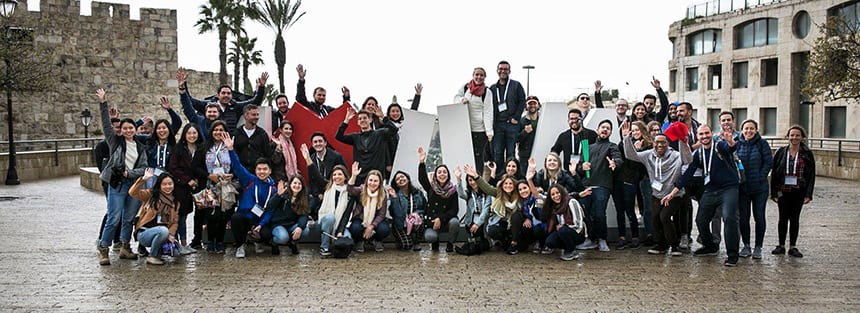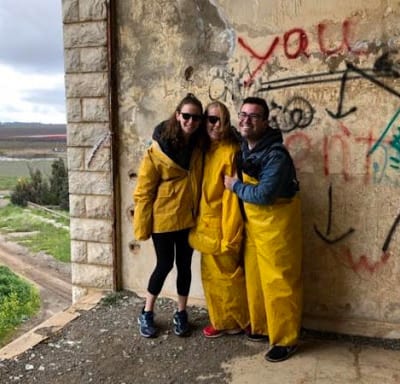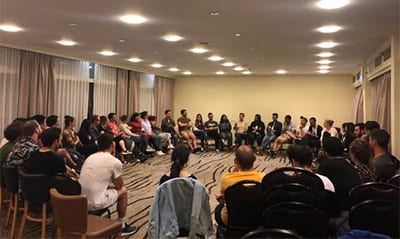
By Olivia Wittels ’19
Originally published via Medium.
As an itrek leader, nearly-graduated law student, Zionist, and American Jew, it’s difficult to put into words how meaningful this trip was. Yet never one without something to say, I will try to encapsulate what this eight day adventure meant to me, both in Israel and, in the spirit of graduation, looking toward the future.
Twelve years ago I arrived in the Holy Land for the first time, on a family vacation. Seven years later, in 2014, I arrived on Taglit in the midst of Operation Protective Edge. Birthright turned out to be a rather life-shattering experience — and not just because I faced exploding rockets fired by terrorists in Gaza at innocent Israeli civilians and tourists alike. The trip ignited my interest in understanding more about the complexities of the Middle East and sparked a deeper connection to my Jewish homeland.

Five years post-Birthright — after a few more Israel visits, an Israel advocacy Boot Camp in NYC (shouts to Fuel for Truth), a summer internship at an Israeli legal nonprofit focused on anti-terrorism litigation, and three years of dealing with fairly frequent antisemitism at Berkeley Law — I landed in Ben-Gurion International Airport for the sixth time. I felt ready — for Purim! — but also to lead 47 Berkeley and 3 Israeli law students on a trip that I, along with my #DreamTeam co-leaders Kate and Alex, spent hundreds of hours planning. Understanding the limitations of having just eight days in Israel, we nevertheless hoped to provide as broad of an overview and as many perspectives as possible to our itrekkers, most of whom were not Jewish and had never set foot in this part of the world.
The endeavor was overwhelming and exhausting, mentally and emotionally draining. Each day, our group engaged with speakers and sites, eagerly questioned our outstanding tour guide, Karen, enthusiastically participated in our processing sessions, and consumed ungodly amounts of hummus and falafel.
For eight days, I got to see Israel through the eyes of 50 different people. There is so much about this tiny country that has captured my heart. To see our participants’ wonder while walking around the Old City (spirits un-dampened by the soggy weather), to mourn and learn lessons from the Holocaust at Yad Vashem, to experience deep sadness while visiting a Palestinian refugee camp, to hear gleeful yelps while ATVing on the Syrian border in the Golan, to meditate for a quiet moment together at the Sea of Galilee, to share happiness at (finally!) a sunny afternoon on the beach in Tel Aviv, to climb an ancient fortress, and to float together in the Dead Sea, allowed me to fall in love with Israel all over again.
Our Israeli participants immensely enhanced this experience. Karen guided us spiritually and knowledgeably; she made us laugh and cry and think. Our Israeli law students — Or, Asaf, and Yonat — all embraced and were embraced by our group as they shared their personal experiences and daily realities. Hamse, our driver, transported us safely around the country and endured our terrible singing/music choices. They put a face to what it means to be an Israeli, a critically important and unforgettable part of the itrek experience.
As those who know me can attest, I am stubborn and opinionated, particularly when it comes to Israel. And still, itrek opened my mind to new perspectives and challenged my beliefs. I sat through speakers who inspired me, who made me think, who said things that were difficult to hear. I had conversations on the bus, at meals, in between speakers and tourist sites. I made new friends and connections with people from 13 different countries. I laughed, I cried, I reflected. I expanded my mind.
Being a Jew and a Zionist at Berkeley Law over the past three years has been enormously challenging. Much of the antisemitism I’ve experienced is couched in disproportionate criticism of Israel, where my classmates disparage, delegitimize, and demonize the world’s only Jewish state. Just days before itrek, a student group appropriated the Star of David — the symbol of all Jews for hundreds of years — to make a denigrating political statement.
Also disheartening was how some classmates characterized itrek, writing that the trip “hides the realities of the occupation.” While recognizing the constraints of an eight day trip regarding the content we were physically capable of providing, our itrekkers spent a full day in the West Bank. We were guided by a Palestinian tour guide, who shared her struggle straddling two identities as both Israeli citizen and Palestinian. We visited a refugee camp and met with a community organizer who expressed longing for a better future for his people. We had an intimate meeting with top Palestinian negotiator Saeb Erekat, who was incredibly candid about his thoughts regarding the peace process and wary of any attempt by the current US administration to unilaterally broker a solution. We heard from a Palestinian-American businessman, Sam Barhour, about the frustrations of living under military occupation, including the physical and psychological effects that crossing daily checkpoints and constraints on mobility have on Palestinians.

Other classmates criticized our trip for being subsidized. But to receive a no-strings attached budget that permitted us to show nuance, complexity, and the challenges facing both Israeli and Palestinian society was nothing more than a gift. To suggest an insidious motive simply because of the generosity of donors who want graduate students to see a place — one that gets disparate media and international attention — with their own eyes is another disappointing example of the difficulties facing Jewish students at Berkeley.
And yet, after itrek, I have never been so proud to be a Jewish, Zionist, Berkeley Law student. Our itrekkers were willing to listen and to learn, to question others and themselves, to admit when they might be wrong or didn’t know enough to have an informed opinion. They were confident to dialogue with people holding perspectives they didn’t personally share, and unafraid to be vulnerable with strangers.
Thus, returning from itrek I am humbled and I am hopeful. Our goal was for itrekkers to leave Israel with more questions than answers. To not just think of Israel as a country in conflict, but also one with beautiful people, sights, and sounds, amidst its flaws.
Jews are facing an alarming rise in antisemitism — just recently, minority students of color at Berkeley repeated white nationalist rhetoric at Jews in the halls of the student government, the New York Times published an antisemitic cartoon akin to Nazi propaganda, and a deranged white supremacist attacked and murdered Jews in a synagogue. But despite so much animosity towards Jews and Israel, I remain optimistic. Because on itrek, 50 people from all over the world took a chance on three over-excited leaders who promised them excellent food and fun. And in return, our itrekkers reminded me that for all the animosity in the world, there are plenty of open minds and open hearts.
Israel embodies the self-determination of a perpetually persecuted people. It is a refuge for Jews, a homeland, a light in a region filled with so much darkness. A nation that, through grit, determination, and passion, has achieved miracles, yet still has a long way to go. I feel deeply humbled and appreciative for the opportunity to lead Berkeley Law’s itrek. Perhaps more importantly, I am even more determined to continue showing people all that Israel has to offer — the good, the bad, and everything in between.